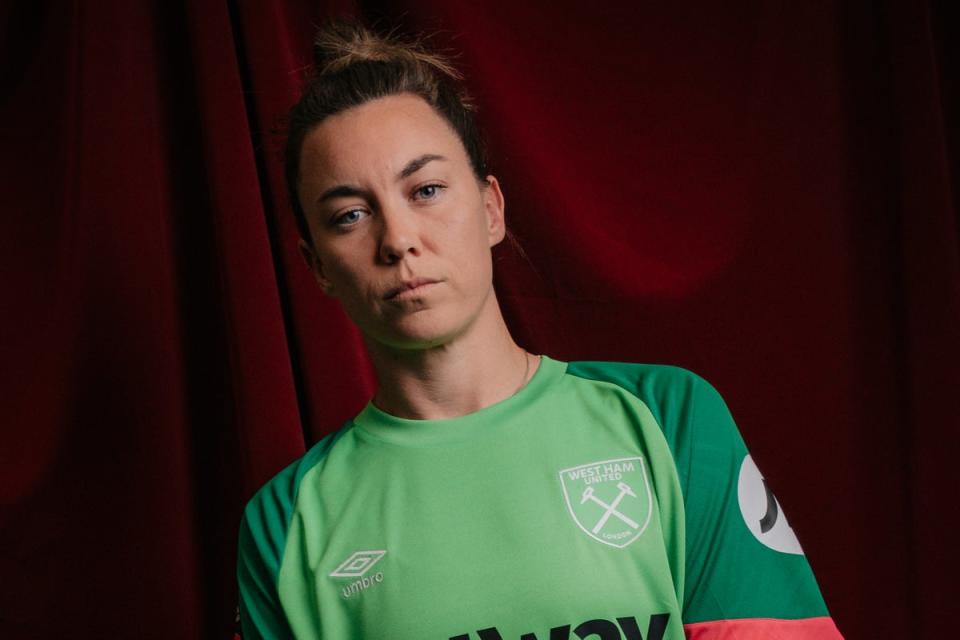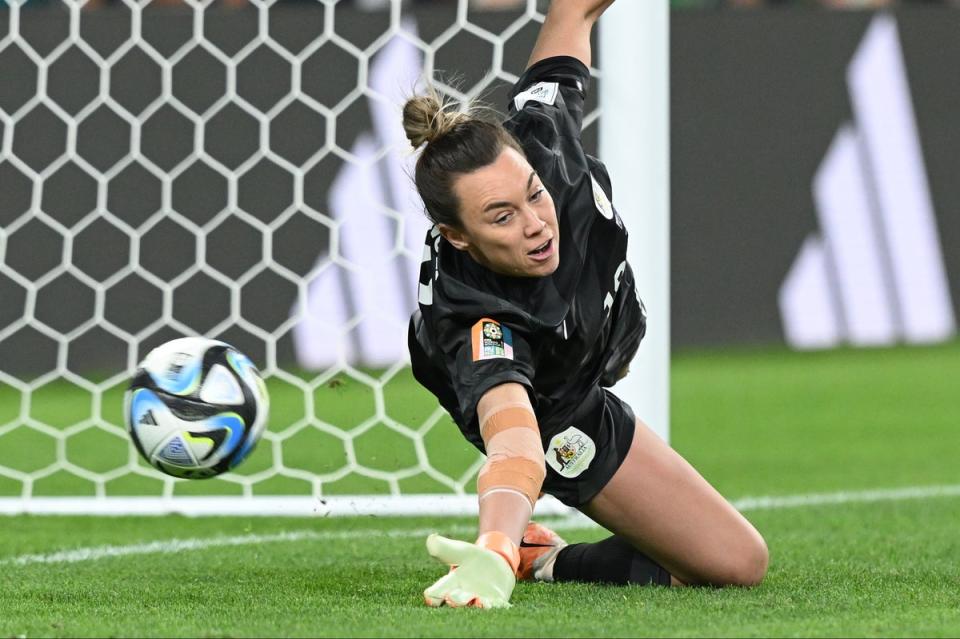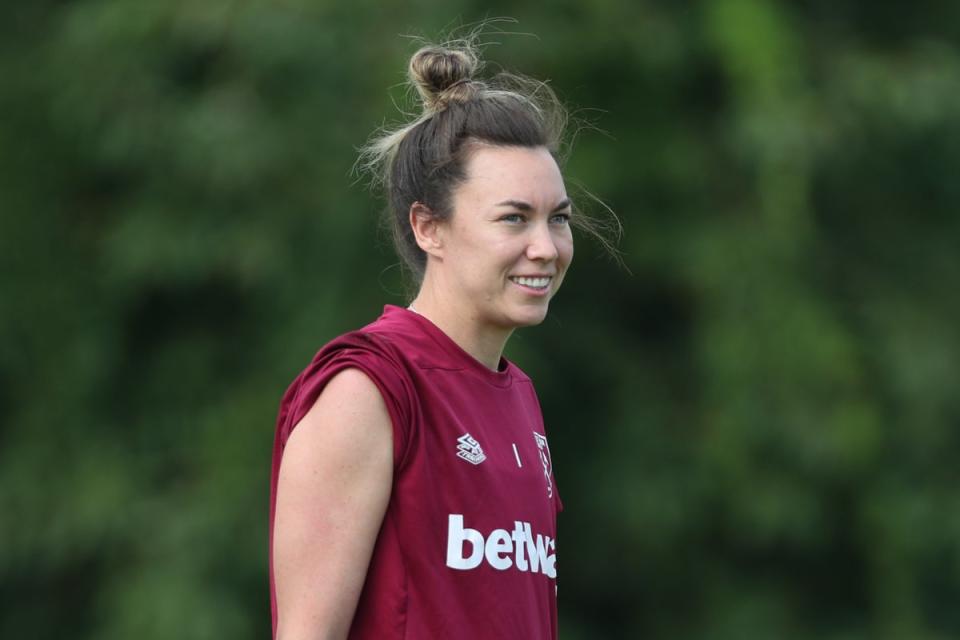Mackenzie Arnold interview: West Ham star on World Cup heroics and being an inspiration in hearing loss battle

It was an instant World Cup classic, the longest stand-off in the history of the men’s or women’s tournament. 20 penalties -13 of them scored, five saved and two missed.
At the end of it all, France were heading home and Australia, on home soil, moving on, to a historic first semi-final. At the heart of it all, a goalkeeper who had touched those infamous penalty extremes of villainy and heroism within the space of a single shootout.
For Mackenzie Arnold, there is plenty to look forward to as we meet at Chadwell Heath on the eve of a new Women’s Super League (WSL) season, with West Ham due to start life under new manager Rehanne Skinner against Manchester City this weekend.
And yet, it is impossible not to be drawn back, to the twists and turns of that iconic night in Brisbane, one that stretched so long as to run dangerously close to becoming an iconic early morning, too.
At one stage, a swifter conclusion looked on the cards. Arnold saved two of France’s first five spot-kicks, the second teeing up a shot at settling the quarter-final without the need for not-very-sudden-death. To the surprise of most inside Suncorp Stadium, and surely all those beyond it, it was the ‘keeper herself ordained to take it.
“It wasn’t the plan,” she explains. “I probably would’ve been about seventh but the subs we’d made pushed me up to fifth. I was talking to my goalkeeper coach at the time while the other girls were in the huddle and the coach was sorting out who would go where. He just shouted, ‘Macca! You’re fifth.’”
She laughs that her face must have dropped when Tony Gustavsson broke the unexpected news, since he had to double-check she was still keen. Even now, knowing the outcome, she says she would step up again. But on the night, her penalty bounced back off the post, having almost broken it in two.

“It’s funny because when I look at the pictures now, I can see all the girls are all head in hands,” she says. “But when I turned around they were all like: ‘No, it’s good, we’re fine’.
“If I had missed that and we’d lost the game, I knew I’d remember that for a very long time. So much motivation came from that miss because I was like, we absolutely cannot lose this game now.”
Arnold made amends not once, but twice, forced to double save from Kenza Dali after the VAR spotted her too keenly off her line. It was youngster Cortnee Vine who finally put France out of their misery, grabbing the third of three match points, but to the millions of Australians invested in the Matildas like never before, it was ‘Macca’ who became an immediate legend.
Arnold had been to matches as a fan during the previous summer’s European Championship in England and watched the Lionesses play in pubs packed with fans, dreaming of her own home tournament but unsure whether Australia, hardly a soccer-mad nation, was capable of creating the same buzz.
“We really wanted to do that but we weren’t really sure how people would react,” she says. “We always knew the first game would be sold out but we thought that would be the event everyone would want to be part of and then it would fade. But game after game kept being sold out and we were just like: ‘Wow, this is mad’.”
By the end, the verdict was unanimous. The Matildas’s semi-final exit to England was watched by the biggest television audience on Australian record and Arnold, in the aftermath, is now dealing with the novel experience of being recognised not only in her homeland, but since arriving back in her adopted one, too.
After seeing the reaction and how many messages I got from mums and daughters, thanking me for speaking out, that spoke volumes to me about how I could make an impact
“That’s massive to me”, she adds, in true West Ham parlance. “It’s all about the Lionesses over here, so that’s cool to see.”
Appreciation, though, has not stemmed only from Arnold’s shot-stopping. In the spring, having suspected for much of her adult life that - like her brother, Sam - she was suffering from hearing loss, she belatedly sought specialist advice and began wearing hearing aids, realising during the mask-wearing Covid era the extent to which she had relied on lip-reading as part of communication.
“When I was in busier environments and there was a lot of background noise, I’d just find myself zoning out a bit,” she says. “When we’re in the meal room or something, or if I was meeting someone new, I’d be hesitant to engage in conversation in case I couldn’t hear them.”
The 29-year-old posted about the experience on Instagram and while it was far from her intention to become a source of inspiration, as her World Cup escapades have expanded her platform, so too awareness has grown.

“I was just so hesitant about getting them in the first place that I didn’t want it to be a conversation with every single person that saw me with them,” she says. “I thought I may as well just put it out and everyone can see and then I can just go back into my bubble to deal with it myself.
“But after seeing the reaction and how many messages I got from mums and daughters, thanking me for speaking out about it, that spoke volumes to me about the way I could actually make a little bit of an impact.”
For now, the benefit lies off the field, Arnold finding the devices “a bit too fiddly” to wear during games. Thinking back to the summer, she smiles: “Even with them in, with 80,000 people going I don’t think I’d have heard anything anyway!”
Tickets are still available for West Ham’s opening game of the Barclays Women’s Super League season against Manchester City here.

 Yahoo Sports
Yahoo Sports 
